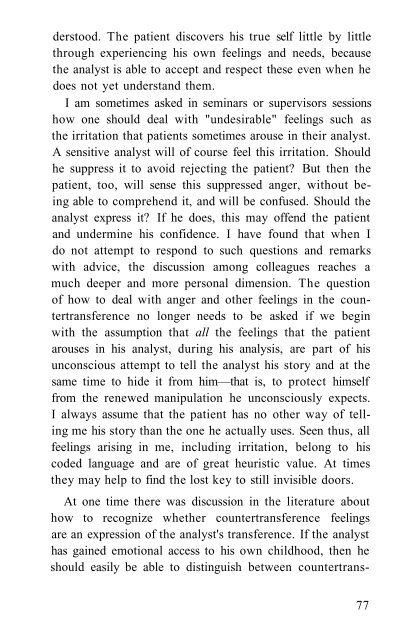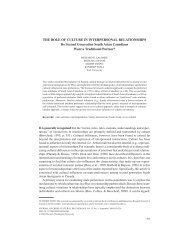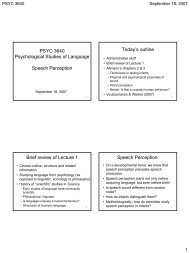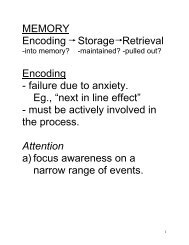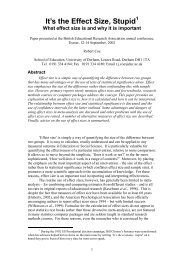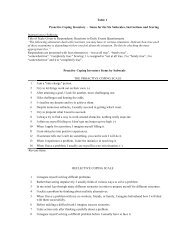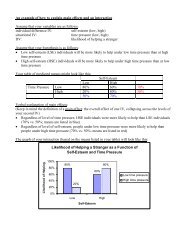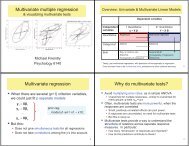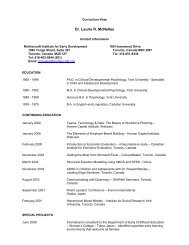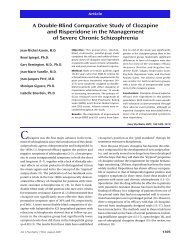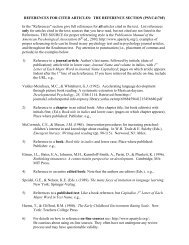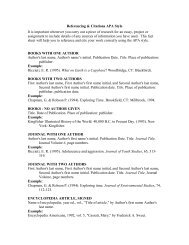The Drama of the Gifted Child (The Search for the True Self)
The Drama of the Gifted Child (The Search for the True Self)
The Drama of the Gifted Child (The Search for the True Self)
You also want an ePaper? Increase the reach of your titles
YUMPU automatically turns print PDFs into web optimized ePapers that Google loves.
derstood. <strong>The</strong> patient discovers his true self little by little<br />
through experiencing his own feelings and needs, because<br />
<strong>the</strong> analyst is able to accept and respect <strong>the</strong>se even when he<br />
does not yet understand <strong>the</strong>m.<br />
I am sometimes asked in seminars or supervisors sessions<br />
how one should deal with "undesirable" feelings such as<br />
<strong>the</strong> irritation that patients sometimes arouse in <strong>the</strong>ir analyst.<br />
A sensitive analyst will <strong>of</strong> course feel this irritation. Should<br />
he suppress it to avoid rejecting <strong>the</strong> patient? But <strong>the</strong>n <strong>the</strong><br />
patient, too, will sense this suppressed anger, without being<br />
able to comprehend it, and will be confused. Should <strong>the</strong><br />
analyst express it? If he does, this may <strong>of</strong>fend <strong>the</strong> patient<br />
and undermine his confidence. I have found that when I<br />
do not attempt to respond to such questions and remarks<br />
with advice, <strong>the</strong> discussion among colleagues reaches a<br />
much deeper and more personal dimension. <strong>The</strong> question<br />
<strong>of</strong> how to deal with anger and o<strong>the</strong>r feelings in <strong>the</strong> countertransference<br />
no longer needs to be asked if we begin<br />
with <strong>the</strong> assumption that all <strong>the</strong> feelings that <strong>the</strong> patient<br />
arouses in his analyst, during his analysis, are part <strong>of</strong> his<br />
unconscious attempt to tell <strong>the</strong> analyst his story and at <strong>the</strong><br />
same time to hide it from him—that is, to protect himself<br />
from <strong>the</strong> renewed manipulation he unconsciously expects.<br />
I always assume that <strong>the</strong> patient has no o<strong>the</strong>r way <strong>of</strong> telling<br />
me his story than <strong>the</strong> one he actually uses. Seen thus, all<br />
feelings arising in me, including irritation, belong to his<br />
coded language and are <strong>of</strong> great heuristic value. At times<br />
<strong>the</strong>y may help to find <strong>the</strong> lost key to still invisible doors.<br />
At one time <strong>the</strong>re was discussion in <strong>the</strong> literature about<br />
how to recognize whe<strong>the</strong>r countertransference feelings<br />
are an expression <strong>of</strong> <strong>the</strong> analyst's transference. If <strong>the</strong> analyst<br />
has gained emotional access to his own childhood, <strong>the</strong>n he<br />
should easily be able to distinguish between countertrans-<br />
77


